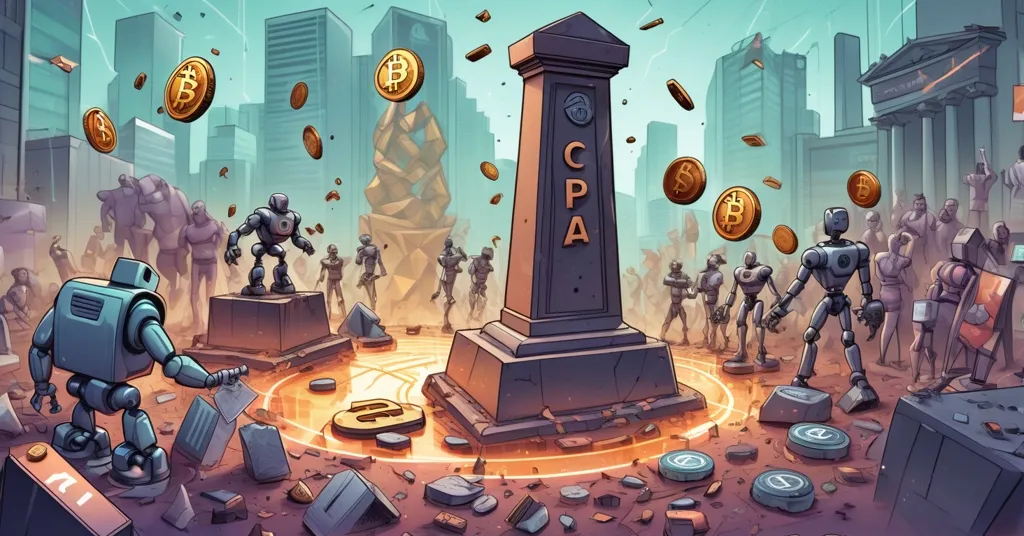PUMP Token Crashes 14% Below ICO Price as Airdrop Plans Are Scrapped

PUMP Token Tanks 14% Below ICO Price After Airdrop Plans Get Shelved
The memecoin rollercoaster just took another gut-wrenching drop, with PUMP—the native token of Solana-based launchpad Pump.Fun—crashing 14% below its ICO price in a mere 24 hours. The culprit? Founder Alon Cohen’s blunt announcement that there’s no immediate airdrop on the horizon, dousing the speculative flames that often fuel tokens like this with a bucket of ice-cold reality.
- Price Meltdown: PUMP plummeted 14% in 24 hours and 40% over the past week, now trading at $0.0031, a 50% fall from its peak of $0.0068.
- Airdrop Delayed: Cohen opts for long-term ecosystem growth over short-term hype, deferring any token giveaway.
- Platform Woes: Declining users and rising competition from rivals like LetsBonk spell trouble for PUMP’s recovery.
The Crash: Numbers and Nosedives
Let’s cut to the chase and unpack this mess. PUMP kicked off with an ICO price of $0.004, covering 12.5% of its massive 1 trillion token supply. On its debut trading day, July 16, it rocketed to an all-time high of $0.0068, riding the wave of memecoin mania that’s become a hallmark of Solana’s blockchain. But the party didn’t last. The token has since shed half its value, currently wallowing at $0.0031, with a market cap also down 14%. For those new to the scene, a memecoin is a cryptocurrency often born from internet jokes or viral trends—think Dogecoin on a sugar rush. They rarely boast deep utility and instead thrive on community buzz and wild speculation. Pump.Fun, as a memecoin launchpad, acts like a digital playground where anyone can mint and trade these quirky tokens in minutes, often with just a few clicks. It’s a brilliant idea until the hype fades—or the bots take over.
The Airdrop Debacle: Hype on Hold
The spark for this latest carnage came during a live discussion hosted by Michael “ThreadGuy” Jerome, where Alon Cohen delivered a reality check to eager speculators. If you’re unfamiliar, an airdrop is essentially free tokens handed out to holders or users, often as a marketing ploy to spike interest and price. Cohen, however, had other plans:
“We want to make sure that it is a meaningful airdrop and it is executed well. We’re actually focusing on bringing back a lot of that attention and hype to our ecosystem. That being said, the airdrop is not going to be taking place in the immediate future.”
So, is Cohen playing a master strategist, betting on substance over flash, or just stalling while the ship takes on water? His focus on building real utility for Pump.Fun sounds noble in a market drowning in greed and FOMO—fear of missing out—but it’s a brutal wake-up call for investors who were counting on an airdrop to pump their bags. Without that shiny carrot, sentiment has tanked, and the price chart looks like a cliff dive, as detailed in this report on PUMP’s 14% crash post-airdrop delay. But here’s a devil’s advocate take: are airdrops even necessary for memecoin success? Sure, they inflate prices temporarily, but don’t they just postpone the reckoning for platforms without a solid foundation? Maybe Cohen’s forcing a hard pivot to value creation over value extraction. Risky? Hell yes. But it might be the gutsiest move in a space obsessed with quick wins.
Pump.Fun’s User Exodus: Numbers Don’t Lie
The pain for PUMP doesn’t end with dashed airdrop dreams. Pump.Fun’s user base is shrinking faster than a popped balloon. Once the undisputed champ of Solana memecoin launchpads, it’s been knocked off its pedestal by a scrappy newcomer, LetsBonk, which seized over 50% market share with 22,000 token mints on July 9 compared to Pump.Fun’s paltry 8,334. What’s LetsBonk’s secret sauce? Lower fees, a cleaner interface, and a buy-and-burn mechanism for its BONK token that builds trust—something Pump.Fun sorely lacks amid murmurs of scams and clunky design. Broader Solana trends aren’t exactly a lifeline either. While non-vote transactions—basically everyday user actions like minting or swapping tokens—are ticking up, total token launches are flat, signaling a market reshuffle rather than genuine growth, as seen in this analysis of declining user activity on Pump.Fun. It’s less a rising tide and more a game of musical chairs, and Pump.Fun’s left standing without a seat.
Are Bots the Real MVPs?
Dig a little deeper, and the picture gets uglier. Blockchain analytics, as highlighted by Coinbase’s Conor Grogan, reveal that bot activity likely dominates platforms like Pump.Fun. Top accounts are launching new tokens every three minutes—a pace no human could sustain. These automated programs create a mirage of demand, tricking retail investors into thinking there’s real buzz before the inevitable orchestrated dump. It’s a dirty little secret that erodes trust and fuels volatility. So, how much of Pump.Fun’s past “success” was even organic, and how much was just algorithmic smoke and mirrors? If Cohen’s serious about long-term growth, tackling this bot infestation with anti-bot filters or proof-of-humanity checks might be step one. Until then, PUMP’s value is built on shaky, possibly fake, ground, a concern echoed in broader discussions about Solana memecoin trends.
Investor Drama: Whales and Woes
The investor side of this saga is pure crypto soap opera. Jeffrey Huang, better known as Machi Big Brother, a whale with a knack for high-stakes disasters, has doubled down on his long position in PUMP despite a jaw-dropping $5.8 million loss. This isn’t his first rodeo—Huang’s bled $4 million on APE and related NFTs in the past, seemingly living by the mantra “go big or go broke,” as discussed in this Reddit thread on his investment strategies. Is this blind optimism or a masochistic streak? Meanwhile, two private sale investor wallets offloaded over 1.2 billion PUMP at $0.003, swallowing a $1.19 million loss. These fire sales scream panic—or at least a sobering realization that PUMP’s short-term prospects are grim without a hype catalyst. It’s the kind of volatility that makes even hardened crypto veterans flinch, and it lays bare the speculative fever gripping much of the altcoin space, where FOMO often trumps fundamentals.
Solana’s Memecoin Scene: Reloading or Fading?
Zooming out, PUMP’s plight isn’t happening in a vacuum. Solana’s memecoin ecosystem is a mixed bag right now. DEX trading volumes are holding steady, and validator tip income—a sign of network activity—is climbing, as Bitget COO Vugar Usi Zade notes with cautious optimism, suggesting the space is “reloading, not stagnating.” Yet, new token launches aren’t keeping pace, hinting at either maturation or burnout. Per industry reports, Solana memecoin trading spiked 20% in Q2 this year, but the shine might be wearing off for smaller platforms like Pump.Fun. LetsBonk’s partnership with DEXs like Raydium shows how some rivals are adapting, while Pump.Fun’s struggles mirror past Solana flops—think NFT marketplaces like OpenSea losing ground to Magic Eden without lifting the overall market. Can Pump.Fun pivot and reclaim its spot? Possibly, but it’ll need more than promises—it’ll need a reinvention. Could Cohen integrate DeFi features, streamline the user experience, or forge strategic alliances? If he’s banking on utility, those are paths forward. But in a meme-driven niche where attention spans are shorter than a viral clip, will anyone stick around to see it? Community sentiment on platforms like Reddit reflects mixed views on PUMP’s price crash.
Memecoin Madness: Innovation or Insanity?
Stepping back, this whole fiasco is a snapshot of crypto’s wild frontier. Memecoin launchpads like Pump.Fun dance on the edge of brilliance and chaos, embodying the raw, unfiltered spirit of blockchain—anyone, anywhere can build something new, even if it’s a mess. That’s a freedom traditional finance can’t touch, and it’s why we’re passionate about decentralization at Let’s Talk, Bitcoin. But let’s not sugarcoat it: this space is also a breeding ground for scams and speculation. PUMP’s tumble isn’t just a bad day on the charts—it’s a cautionary tale, with insights into how airdrop delays can impact memecoin prices. If you’re dabbling in memecoins, cap your exposure at 5-10% of your portfolio; the high risk means high loss potential. Check a platform’s user metrics on tools like Dune Analytics before jumping in, because numbers can lie when bots are at play.
For Bitcoin maximalists, this is yet another reason to roll your eyes at altcoin shenanigans—Bitcoin doesn’t need gimmicks like airdrops to prove its mettle as sound money. And honestly, they’ve got a point; BTC’s stability and purpose tower over memecoin casinos. But let’s not pretend Bitcoin fills every gap. Platforms like Pump.Fun, for all their flaws, experiment with decentralization in chaotic, niche ways that Bitcoin can’t and shouldn’t. They’re the messy labs of a financial revolution, even if half the experiments blow up. The trick is surviving long enough to refine the formula. Some investors share their own cautionary tales on why PUMP crashed after the airdrop delay.
And a word to the shillers out there hyping PUMP or any token to the moon with zero evidence: spare us the crystal ball garbage. Crypto deserves better than your snake oil. We’re here to push adoption through hard truths, not fairy tales. PUMP’s crash is a gut check for the entire space—decentralization lets us build wild, risky things, but it doesn’t guarantee they’ll last. Are we innovating, or just gambling with shinier tech? Stay sharp, because in this game, the house doesn’t always win—but it often cashes out first.
Key Questions and Takeaways on PUMP’s Downfall
- Why did PUMP crash 14% below its ICO price so fast?
Founder Alon Cohen’s announcement of no immediate airdrop killed the speculative hype that often props up memecoin prices, triggering a rapid sell-off. - What is Pump.Fun, and why is its token in trouble?
Pump.Fun is a Solana-based memecoin launchpad for creating and trading meme tokens; PUMP’s value is tied to platform engagement, which is fading amid user drop-off and fierce competition. - Does delaying the airdrop hurt or help PUMP long-term?
It hurts short-term as investors bail, but could help if Pump.Fun builds real utility—though that’s a steep climb given current user and trust issues. - How do bots impact platforms like Pump.Fun and PUMP’s value?
Bots inflate activity by launching tokens at unreal speeds, creating fake demand that misleads investors and adds to volatility when real users don’t materialize. - Can PUMP bounce back without an airdrop or quick hype?
Recovery hinges on Pump.Fun boosting organic user growth and outpacing rivals like LetsBonk, a tough ask in a crowded, fickle market without a clear catalyst.



